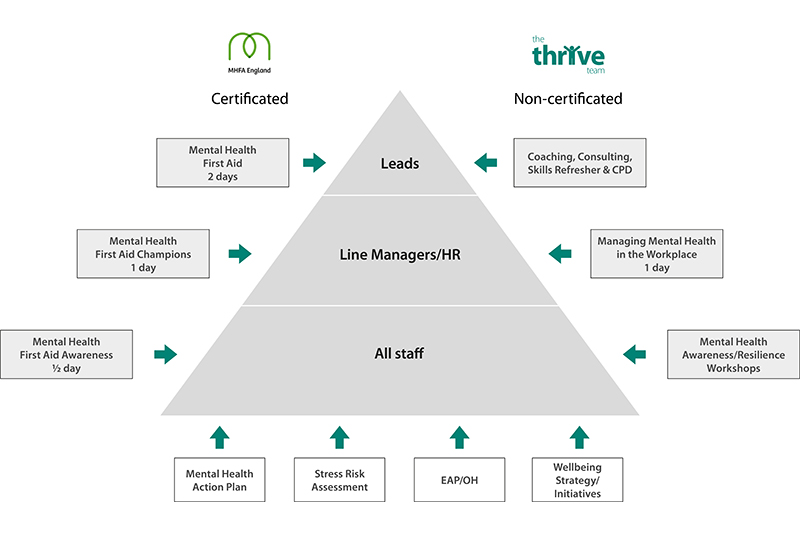
Thriving at Work, a report commissioned by Theresa May in 2017 and written by Lord Dennis Stephenson (ex HBOS Chairman) and Paul Farmer (Chief Executive, Mind) sets out what employers can do to better support all employees, including those with mental health problems to remain in and thrive through work.
Encouraging open conversations about mental health is one of the six core standards set out in the report. But how do you have a conversation about mental health? Most conversations about health can feel awkward for both parties, particularly if they’re taking place at work but it’s often much more difficult when that conversation is about mental health.
According to Mental Health First Aid England, 57% of UK employees say they have experienced mental health issues at work but less than half of that group felt confident to open up about it. I’d suggest that lack of confidence exists because:
• They were scared their honesty would affect their job in some way
• They didn’t feel they would be listened to
• They didn’t feel they would get support
If you had concerns about someone’s mental health or if someone was honest enough to open up to you would you know how to handle that conversation confidently? It can feel daunting, you’re worried you’ll make someone feel worse but it’s more likely the individual will feel relieved that you showed that you cared.
Here are my top tips to help you have that conversation:
CREATE the right environment – grab a drink and head somewhere quiet and free of distractions.
“HOW ARE YOU?” will normally be met by the standard “I’m fine” so be prepared to follow up with something along the lines of “I’ve noticed you haven’t seemed yourself lately, is there anything you want to talk about?”.
LISTEN – I don’t mean hear the words as you plan your opening line to ask for the latest project update. I mean really listen without interrupting.
BE OPEN with your body language (e.g. appropriate levels of eye contact) and consider cultural differences. Look for clues in body language about how they’re really feeling.
SHOW EMPATHY and be NON JUDGMENTAL – try to put yourself in their shoes.
ASSUMPTIONS can be easily made but you shouldn’t try to guess what symptoms an employee might have and how these might affect their ability to function and do their job. Many people are able to manage their mental health and work to a high standard and may require support measures when experiencing a difficult period. Your perspective might be useful, but try not to assume that you already know what may have caused their feelings, or what will help.
ASK QUESTIONS – How are you feeling at the moment? How long have you been feeling like this? Are there any factors at work/home that are contributing? Have you visited your GP? If so what did they recommend? What can we do to help? Keep the focus on feelings.
SILENCE is golden but can feel awkward for you as the listener. Try to avoid filling the gaps with another question and allow your colleague time to think and respond.
OFFER SUPPORT – practical and emotional, not glib platitudes. Let them know about any company support services such as your Employee Assistance Programme or Occupational Health department if you have them. Remind them to visit their own GP if they haven’t already and suggest other avenues of support such as Mind or Samaritans.
FOLLOW UP ON ANY ACTIONS and keep the conversations going – check in at an appropriate point in the future to see how they’re doing.
CONFIDENTIALITY is vital for creating and maintaining trust. Only share information with the express permission of the individual. If you believe the person is at risk of harm to themselves or others you should seek professional medical help and support for the individual with their knowledge.
KEEP YOURSELF SAFE – It’s important to maintain strong boundaries and not take on the problems of others. Reflect on what you need to take care of yourself.
In the CIPD (Chartered Institute of Personnel and Development) Health and Wellbeing at Work Survey 2019 only 30% of respondents said managers are confident to have sensitive discussion/signpost staff to expert help.
The Thrive Team offer a range of training and awareness sessions for all levels of the organisation to help build awareness and confidence in workplace mental health issues.





